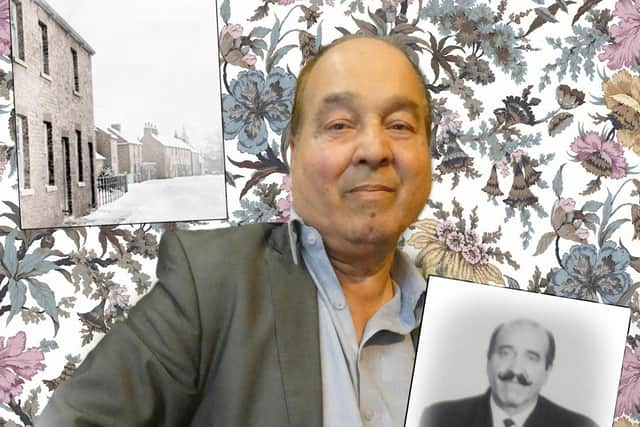Heckmondwike Stories In A Suitcase: Mahmood comes to England at the age of 11
and live on Freeview channel 276
He was part of a large group of Indian and Pakistani nationals who were encouraged to come and work in our local mills throughout the post-war decades of the 1960s and 1970s.
These men came to Britain because of a severe labour shortage existing during that period across the whole country.


Advertisement
Hide AdAdvertisement
Hide AdAs someone who now makes up a dwindling generation, Mr. Hussain has agreed to be interviewed for the Kirklees Faith Network's "Heckmondwike Stories In A Suitcase" project.
Speaking to the Reporter Series, Mr. Hussain said: "My age was only eleven years when I came to England in February 1966. It will seem surprising to anyone who reads this story but no one else was with me during that very first aeroplane journey of mine!
"My father, who was already working at T.A Firths in Heckmondwike, sponsored my visa application. He had been the first member of our household to settle in England. I was to be the second person in my family to join him. I started making preparations for the journey after he paid for my airline ticket.
"My father's name was 'Sephoy' (Private) Lal Hussain. He had served in the British-Indian Army during the Second World War. As a soldier, he fought the Japanese in Burma, and in Malaya.
Advertisement
Hide AdAdvertisement
Hide Ad"My father was well educated. He was one of those very few men in his generation who could actually read and write in the Urdu language.
“After the war, he worked as an employee of the Pakistani Civil Service for a few years until news began to spread across the Punjab province about job opportunities available in England's mills. So, My father resigned from the civil service and came to England in the year 1960. He immediately found work in the Heavy Woollen District.
"My mother's joy after receiving the air-travel ticket from him quickly turned to tears when she realised her little son would also soon be moving to England.
"But this is what life was like in those days for most boys of my generation growing up in 1960's rural Pakistan. We had to quickly adapt and learn new life skills.
Advertisement
Hide AdAdvertisement
Hide Ad"The economic situation of that Sixties decade forced many of us to leave our mothers behind in Pakistan. The whole experience was emotionally painful. But we had to be mentally strong to cope with the trauma of separating from loved ones.
"The background to my new life was a severe labour shortage existing throughout the 1960's in the mills of Britain. Factories in places like the Midlands and in the north were really desperate to employ more workers.
"Large numbers of former-soldiers from the old British-Indian Army had already begun arriving by the late-1950's and early-Sixties to fill up the manual shortages in our own Heavy Woollen District's mills.
“My father was amongst this group of first-generation Pakistani men. They seemed to be doing more than their fair share for the local economy by working long shifts in the day and equally long hours through the 'nights'.
Advertisement
Hide AdAdvertisement
Hide Ad"But the population of these first-generation migrant workers was not large enough to keep the factories operational. The Foremen and managers of the mills were now asking the 'old soldiers' to bring over their sons from Pakistan and India.
"So my ticket to England was booked on a Pakistan International Airlines (PIA) flight.
"All I had in my hands on the day of departure from Rawalpindi airport - as I boarded the aeroplane - was just one small suitcase and a £5 note in my pocket!
“The suitcase and money were the only two possessions I had when the aircraft eventually moved off the runway and headed towards the Pakistani harbour city of Karachi where it halted for a while to allow more passengers to come on board. The aeroplane then flew off again into the sky.
Advertisement
Hide AdAdvertisement
Hide Ad“The journey was much longer than today's average eight-hour flight duration from Islamabad to Manchester. But the long 14 hour flight I was on did not bother me at all. As an 11-year-old child, I was just so excited to be sat in an aeroplane.
"My father had already turned up in the arrivals lounge as the aeroplane landed on the runway of Heathrow Airport. The time was well into the late-afternoon when I came outside after having my passport stamped. I can remember it was February 1966 and Britain was in the grip of a very cold winter.
"Our car soon arrived outside a cul-de-sac in Heckmondwike after a long seven hour journey. The cul-de-sac was made up of at least six run-down back-to-back terraced houses. I went into one of the small properties with a number '97' fixed on its front wooden door. It was to be my home for the next several years. My father walked in behind me with the luggage. The cul-de-sac's name was Parker Close.
"As I settled into my new life, I often saw these former-British-Indian soldiers walking the streets of Heckmondwike whenever I used to play outside. Most of the men had tall physiques and broad shoulders - but then, they were of course old soldiers. They never intimidated anyone. These law-abiding men had a lot of respect for authority and the rule of law. In fact, this first-generation just kept its head down and got on with their work in the local mills.